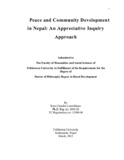Please use this identifier to cite or link to this item:
http://archive.nnl.gov.np:8080/handle/123456789/161| Title: | Peace and Community Development in Nepal: An Appreciative Inquiry Approach |
| Authors: | Lamichhane, Ram Chandra |
| Keywords: | Community Mediation Groups and CBOs. Local Peace Committee, |
| Issue Date: | 24-Mar-2019 |
| Abstract: | This study identifies and critically examines the factor rooted of sustainable peace, inclusive community development, their possible positive impacts in future, and required new system with possible activities. It also explores the inter-connections between sustainable peace and inclusive community development in existing peace initiatives and inclusive community development programs of different districts of the country. The data for this study collected from all five development regions of the country. The purposive sampling methods was applied to select the study areas. This study has covered the four thematic areas including Community Mediation, Local Peace Committee, Poverty Alleviation Fund and NGOs Supported Program, which are directly related with Peace and Community Development in Nepal. The data collected through focused group discussions, field observation, and Appreciative Inquiry interview. These methods have further substantiated by literature review and secondary data. All total 490 persons were contacted from all over the country including Mountainous, Hilly, and Terai Madesh regions. Appreciative Inquiry Approach is the main foundation of this study. The framework of the study was developed based on theoretical foundation of appreciative inquiry in relation with peace and community development. One most important aspect of this study is that it is based on strength-based approach in peace and community development in ongoing situation in Nepal. This study has discovered and adequately analyzed the factors rooted in peace and inclusive community development, future vision, required strategy to achieve vision and major goal, key stakeholders and potential actions. Therefore, efforts have been made here to examine the existing practices in peace and inclusive community development in reference to Appreciative Inquiry, which has tried to unleash the potential scope of peace and inclusive community development. The conceptual framework developed in this study is mainly based on Coopperrider’s school of thought of “Appreciative Inquiry” intended for use in discovering the positive cores for sustainable peace and inclusive community development and their linkage till the destiny. This study has framed on 4 “D” cycle (Discovery, Dream, Design and Destiny) of Appreciative Inquiry. The theoretical framework has assumed that the “affirmation” of 7 topics of the research with appreciative inquiry can discover the positive factors for sustainable peace and inclusive community development. In the proposed model, peace and inclusive community development grow in affirmative inquiry and visioning. The application of Appreciative Inquiry to analyze the ongoing initiatives for peace and community development has explored the major positive cores, which have been enabling environment for sustainable peace and inclusive community development in Nepal. The dream process has united people to create common visions for future. Designing process has helped them to create the provocative proposition and design the new social architecture for sustainable peace and inclusive community development. Destiny process has made the vision achievable by developing the goal, specific objectives as well as identification of major actions for future. This study has also complement to the 4 “D” cycle of Appreciative Inquiry by developing the components of each “D” based on its theory and local practices and required to generate the information in each process. This study found the factors rooted in Inclusive participation for Sustainable Peace and Inclusive Community Development Process at local level. This study found that the peace building and inclusive community development is an integrated way from the outset. Peace building and inclusive community development measures must consider the long-term implication for development approaches. Sustainable peace and inclusive community development is common responsibilities of government, civil society and social organizations. It is about the joint efforts of multiple stakeholders. Short-term peace building process (resolution of disputes or re-union programs etc.) should be combined with long-term approaches that strengthen capacity of local governing political institutions like VDC, Municipalities, DDCs, Local Peace Committees, Community Mediation Groups and CBOs. |
| URI: | http://103.69.125.248:8080/xmlui/handle/123456789/161 |
| Appears in Collections: | 300 Social sciences |
Files in This Item:
| File | Description | Size | Format | |
|---|---|---|---|---|
| Thesis- April 2016-Final.pdf | 12.3 MB | Adobe PDF |  View/Open |
Items in DSpace are protected by copyright, with all rights reserved, unless otherwise indicated.